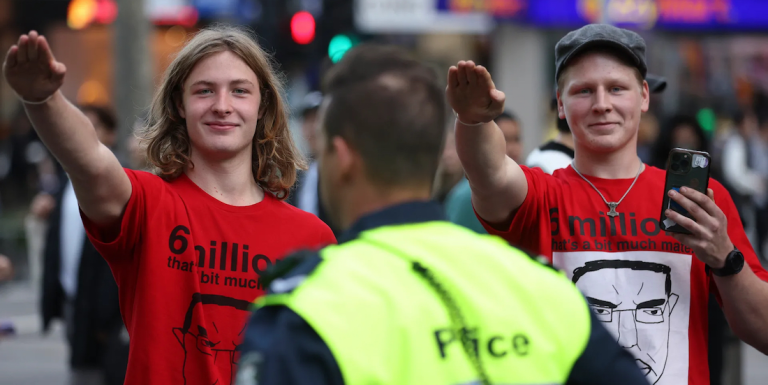
Berlin – Kanye West, now known as Ye, has ignited global controversy with his latest single, “Heil Hitler,” a track that explicitly praises Adolf Hitler and incorporates Nazi imagery and rhetoric.
According to a May 13, 2025, report by Deutsche Welle (DW), the song is banned in Germany due to strict laws prohibiting far-right hate symbols, highlighting stark differences in free speech regulations between Europe and the U.S. This provocative release has reignited debates over antisemitism, social media moderation, and the responsibilities of tech platforms in curbing hate speech (Stewardship Report editor’s note: this is Section 86a of the German Criminal Code).
Kanye West’s “Heil Hitler” Sparks Outrage

Ye’s single, released on May 8, 2025, features lyrics referencing the Nazi salute “Heil Hitler,” artwork resembling a swastika, and a lengthy sample of a Hitler speech.
DW reports that the track has been banned from major streaming platforms like Spotify, YouTube, and SoundCloud for its antisemitic content. However, it remains accessible on Elon Musk’s X platform, where it has garnered millions of views.
“Despite being banned on most social media platforms, a provocative new single by Ye…remains on Elon Musk’s X platform,” DW notes, underscoring the platform’s lighter moderation policies.
The song’s release coincided with VE Day, marking the 80th anniversary of Nazi Germany’s defeat, amplifying its provocative impact. DW highlights Ye’s history of antisemitic behavior, including multiple suspensions from X and the termination of his Yeezy contract with Adidas after antisemitic rants. The American Jewish Committee condemned the track, with CEO Ted Deutch stating, “This is blatant antisemitism, and it’s disgusting,” urging the music industry to denounce Ye’s actions.
Germany’s Strict Anti-Nazi Laws
In Germany, the song violates Section 86a of the German criminal code, which bans public dissemination of Nazi symbols and slogans, such as the swastika and “Heil Hitler,” except in specific contexts like art or historical critique.
DW explains, “The public display or dissemination of Nazi symbols and slogans… became a criminal offense” post-World War II to address the Holocaust’s traumatic legacy. This legal framework reflects Germany’s commitment to combating far-right extremism, contrasting with the U.S.’s broader First Amendment protections, where such content is not illegal.
The Nazi salute, as Deutsche Welle notes, originated in
ancient Rome, was adopted by Benito Mussolini, and
became a hallmark of Hitler’s regime from 1933 to 1945.
Germany’s postwar policies aim to prevent the glorification of such ideologies, making Ye’s song a clear legal violation. Despite bans, enforcement challenges persist, as clips of the song circulate on social media, complicating efforts to suppress its spread.

Social Media’s Role in Amplifying Hate
The song’s persistence on X and reuploads on platforms like Facebook, Instagram, and Reddit highlight inconsistencies in content moderation.
DW reports that the Anti-Defamation League launched a petition urging Meta to reinstate stricter guidelines after the company relaxed hate speech rules in January 2025, citing Donald Trump’s election.
“Meta announced in January they would no longer employ fact-checkers, and loosened rules around hate speech,” DW states, noting that Ye’s track still violates Meta’s rules against “harmful stereotypes” like Holocaust denial.
Elon Musk’s X has faced particular scrutiny for hosting the song. DW references activist groups like Led by Donkeys, who projected an image of Musk mimicking a Nazi salute at a Tesla factory in Berlin, captioned “Heil Tesla,” to critique his platform’s leniency,“These platforms… remain a retreat for problematic content,” DW observes, illustrating the global challenge of regulating online hate.
Broader Implications for Free Speech
Ye’s track has fueled debates over free speech versus hate speech regulation. In the U.S., the First Amendment protects controversial expression, allowing figures like Ye to push boundaries. DW contrasts this with Germany’s restrictive approach, noting, “In the U.S., it is not illegal to show [the Nazi salute] or wear a swastika.” This divergence raises questions about balancing artistic expression with preventing harm, especially as Ye’s celebrity amplifies his platform.
The music industry faces pressure to respond, with calls for boycotts of Ye’s work. His upcoming album, “Cuck,” includes tracks like “Gas Chambers” and “Hitler, Ye and Jesus,” suggesting further provocations. DW’s report underscores the need for tech companies to align policies with ethical responsibilities, particularly as antisemitism rises globally.
Kanye West’s “Heil Hitler” Song Ignites Global Controversy (May 16, 2025)
#KanyeWest #Antisemitism #HeilHitler #SocialMedia #NaziBan
#FreeSpeech #GermanyLaws #XPlatform #HateSpeech
Tags: Kanye West, Ye, Heil Hitler, antisemitism, Nazi symbols, Germany laws, social media,
X platform, Elon Musk, free speech, Holocaust, Adidas, Anti-Defamation League, Meta, Spotify
